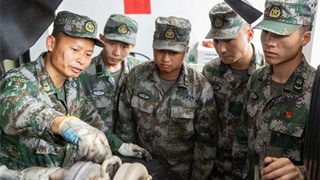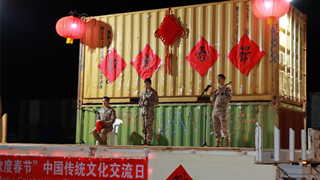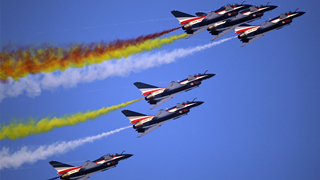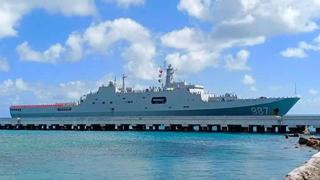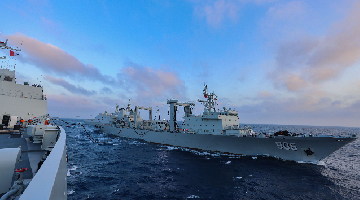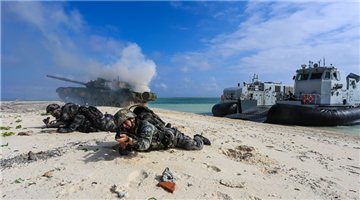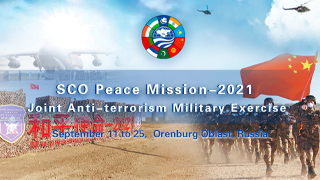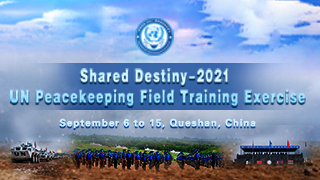By Li Hai
李海
Ukraine has come under the spotlight lately, getting Russia and the US locking horns, the UK, Japan and several other countries fanning up flames on Washington's side, and the EU on the fly to chill down the situation. Many European countries, which are both NATO and EU members, are taking cautious military measures.
近期,乌克兰成为国际焦点。俄美两国剑拔弩张,英日等国紧跟美国煽风点火,欧盟则全力促使局势降温。众多兼具北约和欧盟双重成员国身份的欧洲国家,军事举措十分谨慎。
While Washington has called back its diplomats at its embassy in Ukraine, EU's diplomatic missions are still running normally in Kyiv. Josep Borrell, High Representative of the European Union for Foreign Affairs and Security Policy, said the union will continue to make collective diplomatic efforts and persuade Moscow and Washington to resort to the path of dialogue. Political figures of France and Germany, the dual cores of the union, were busy conducting shuttle diplomacy among the US, Russia and Ukraine, and trying to get the last two back to the Normandy format, a four-party diplomatic group, and put the Minsk Agreements into practice as soon as possible.
在美撤离驻乌克兰使馆人员的背景下,欧盟外交机构仍在基辅正常运转。欧盟外交与安全政策高级代表博雷利表示,欧盟将继续作出集体外交努力,说服俄美走上对话道路。欧盟“双核”法德两国政要,在美、俄、乌之间密集进行“穿梭外交”。法德两国还力促俄乌回归“诺曼底模式”四方会谈框架,加快落实“明斯克协议”。
Why is EU so eager to make peace?
欧盟如此卖力“劝和”,用意何在?
First, it doesn't want the Ukraine situation to embroil itself, which will bear the brunt once war broke out between Russia and Ukraine, in which case it will not only have to take in refugees rushing in from the warring countries but its cooperation with Russia in energy, economy, trade, and technology will also be halted because of the US's "security-kidnapping". That will add fuel to the already burning flame of the pandemic, soaring energy price and inflation that are troubling the European economy at the moment, with the possibility of causing serious social and political crises.
首先,是为了避免乌克兰局势殃及欧盟。俄乌若开战,欧盟将首当其冲。其不仅要承受战火带来的难民“外溢”等直接后果,还将更深地遭受美国“安全绑架”,与俄罗斯的能源、经贸和科技合作将停摆。深受新冠肺炎疫情冲击、能源价格猛涨、通胀高企困扰的欧盟经济将雪上加霜,甚至引发严重社会和政治危机。
Second, it wants to cast a figure in the international community. Having a bigger say over European security will help the union achieve "strategic independence". Commenting on the Ukraine situation lately, Borrell said "we are no longer in Yalta times... Spheres of influence for two big powers do not belong...in 2022", adding that the absence of the EU on the negotiating table concerning Europe's security is "unacceptable". Macron said the Europeans should talk with Russia through a separate channel.
其次,欧盟力图有所作为、展现国际形象。强化对欧洲安全议题的发言权,有助于欧盟实现“战略自主”。博雷利近日针对乌克兰局势声称,“两个超级大国瓜分势力范围的雅尔塔时代已经结束”,并表示,欧盟在涉及欧洲安全的谈判桌上没有一席之地“是不可接受的”。马克龙也宣称,欧洲人应开启与俄“单独对话渠道”。
Third, French and German leaders want to augment the clout of their countries and themselves. Macron's hands-on approach to the Ukraine issue reflects Paris' "sense of responsibility" as the rotating chair of the union and will give a boost to his presidential election in the coming April. The newly elected German Chancellor Olaf Scholz also wants to take the opportunity to prove himself capable of being the helmsman for Germany and the EU in the post-Merkel age.
再次,法德“双核”首脑有意提升本国和本人威望。马克龙就乌克兰问题“亲力亲为”,既可体现法国作为欧盟轮值主席国的“责任心”,也有利于今年4月的总统选举。上任不久的德国总理朔尔茨,也有意借此显示自己能够在“后默克尔时代”胜任德国乃至欧盟“当家人”的角色。
The EU and US' obviously different stance and moves on Ukraine indicate that the EU is reflecting on and adjusting its previous policies and trying to moderate the situation through open communication with all relevant parties. But it won't see much real effect without a tough fight.
面对乌克兰局势,欧盟与美国的立场和步调明显不一致,说明欧盟正在反思和调整既往政策。欧盟致力于缓和局势,与各当事方保持沟通。不过,欧盟的努力要真正见效,还需闯过几道“难关”。
For one thing, its strengths and capacities are being questioned. Russia and the US are still dominating the show in Ukraine, leaving little room for the EU to make much of a difference. Moscow publicly doubted France, indeed the EU's ability to act independently, while Washington cannot put up with EU daring to disagree or even take any "unauthorized" move, claiming itself to be the key player in the issue. Washington's politicians and media also accused Berlin of being intimidated by Russia’s superiority in natural gas into forsaking solidarity within the West…
一是“硬实力关”。俄美两国仍是掌控乌克兰局势走向的真正主角,留给欧盟的腾挪空间有限。俄罗斯公开质疑法国乃至欧盟“独立行事”的能力,美国则不能容忍欧盟的“置喙”乃至“越位”。美方声称,在乌克兰问题上,美国才是关键角色。美国政要和媒体指责德国罔顾西方团结大局,被俄罗斯天然气武器 吓住……
For another, it has to reverse its ideological bias. EU's incessant eastward expansion under the ideological banner and ceaseless efforts to stir up "democratic transformation" or even "color revolution" in former Soviet Union member states is a key reason for Russia's distrust. For the EU-Russia relation to return to a "cooperative, not confrontational" tone, the EU must take practical steps to increase mutual understanding rather than hold up its own values as the yardstick.
二是“价值观偏执关”。欧盟高举意识形态大旗不断东扩,还持续推动原苏联加盟共和国的“民主化改造”乃至“颜色革命”,这是俄罗斯对欧盟不信任的重要原因。要使欧俄关系回归“合作而非对抗”的基调,欧盟需从务实角度出发、争取相互理解,而不是将欧式价值观作为标尺。
Moreover, it has to cement unity within the union. While western European countries are for a mild stance toward Russia, Central and Eastern European countries that joined the union later, harboring deep-seated hatred and horror toward Moscow, strongly demand a larger military presence of the US-led NATO on their soil, support its eastward expansion, and clamor for Ukraine to join the western family. These strategic and cultural divergences rooted in geopolitics make it hard for the EU as a whole to have constructive dialogues with Russia on the Ukraine issue.
三是“团结关”。西欧国家力主对俄缓和,但后期加入欧盟的中东欧国家,对俄罗斯的仇恨与恐惧心理根深蒂固,强烈要求以美国为首的北约扩大在其境内的军事存在,支持北约继续东扩,鼓吹乌克兰“融入西方”。上述根植于地缘政治的战略文化分歧,令欧盟难以作为一个整体就乌克兰问题与俄进行建设性对话。
